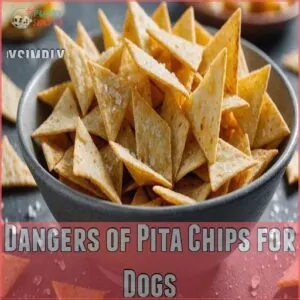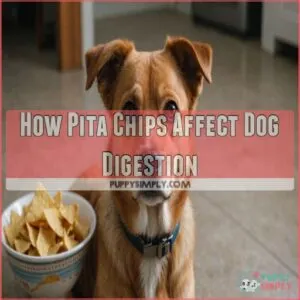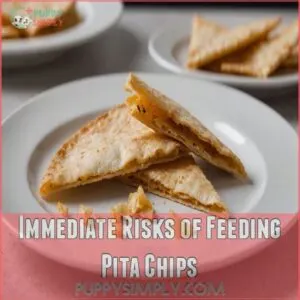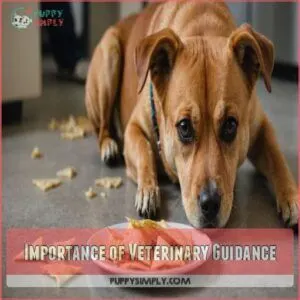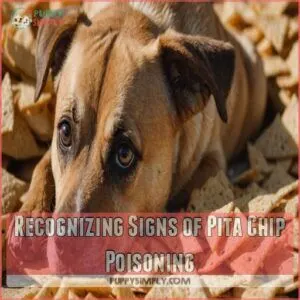This site is supported by our readers. We may earn a commission, at no cost to you, if you purchase through links.

Pita chips are loaded with salt and empty calories, resembling that irresistible yet cringe-worthy impulse snack—you know, like eating an entire tub of ice cream.
Plus, they might contain toxic seasonings like garlic powder.
A small nibble probably won’t harm your furry friend, but don’t make it a habit.
Instead, consider healthier alternatives like carrot sticks or apple slices.
Remember, moderation is key, and what’s tasty to you might turn a tummy for Rover.
Curious about healthy dog snacks like dog biscuits with wholesome ingredients, which include peanut butter, oats, and sweet potatoes. Curious about safe treats for dogs? We’ve got the scoop on that!
Table Of Contents
- Key Takeaways
- Dangers of Pita Chips for Dogs
- Ingredients in Pita Chips
- How Pita Chips Affect Dog Digestion
- Immediate Risks of Feeding Pita Chips
- Long-Term Health Consequences
- Can Dogs Ever Eat Pita Chips Safely?
- Safe Snack Options for Dogs
- Importance of Veterinary Guidance
- Recognizing Signs of Pita Chip Poisoning
- Creating a Balanced Diet for Dogs
- Frequently Asked Questions (FAQs)
- Are dogs allowed to eat pita chips?
- Is pita safe for dogs?
- What chips are safe for dogs?
- Can dogs eat hummus and pita?
- Are there any pita chips without salt?
- Can pita chips cause allergies in dogs?
- How much is too much pita chips?
- What should I do if my dog accidentally eats pita chips?
- Do certain dog breeds react differently to pita chips?
- Conclusion
Key Takeaways
- Avoid giving pita chips to your dog due to high sodium and fat that can cause dehydration, obesity, and other health issues.
- Pita chips often contain toxic seasonings like garlic and onion, which are harmful to dogs, leading to potential allergies and digestive problems.
- If your dog accidentally eats pita chips, monitor them for symptoms like vomiting or lethargy, and consult your vet if necessary.
- Choose dog-friendly snacks like carrots and apple slices instead, ensuring your pet’s diet remains healthy and balanced.
Dangers of Pita Chips for Dogs
Pita chips might make a tasty snack for you, but they’re not the best treat for your dog.
With high levels of sodium, fat, and potentially harmful seasonings, these chips can lead to serious health problems for your furry friend.
High Sodium Content Risks
Ever wonder about the hidden dangers in pita chips?
Their high sodium content isn’t just a salty surprise—it poses real risks for your pup.
Think about:
- Sodium-induced dehydration causing increased thirst
- Kidney health risks due to prolonged strain
- Electrolyte imbalances leading to fatigue and confusion
Keeping your dog’s health in tip-top shape means skipping these salty snacks.
High Fat Content Concerns
High fat content in pita chips often sneaks up on dogs, leading to obesity risk, pancreatitis, and more.
Regularly indulging your furry friend might cause weight gain or digestive upset.
It’s like a slippery slope to fatty liver disease.
Just like tortilla chips, pita chips can also contain high levels of fat, which can be harmful to your dog’s health.
For your dog’s health, opt for dog-friendly snacks instead.
| Health Concern | Possible Outcomes | Better Choice |
|---|---|---|
| Obesity Risk | Weight Gain | Dog Diet Foods |
| Pancreatitis Risk | Digestive Upset | Lean Treats |
| Fat Overload | Fatty Liver Disease | Low-fat Dog Snacks |
Toxic Seasonings and Additives
So, you’ve considered the fat, but what about those yummy seasonings?
Many pita chips contain garlic, onion, or other spices toxic to dogs.
Even preservatives can upset their tummies.
Remember, a little salt goes a long way, and salt toxicity in dogs is a real concern.
Stick to dog-friendly snacks to keep your pup healthy and happy!
Think carrots, apples, or special dog treats.
Your dog’s health depends on it!
Ingredients in Pita Chips
When you’re munching on pita chips, it’s easy to overlook what’s in them—common seasonings, added oils, and potential allergens could be lurking in every bite.
While these ingredients might enhance your snack time, they aren’t suited for your furry friend and could bring unexpected hazards.
Common Seasonings and Spices
Spices like garlic, onion, salt, pepper, and paprika might jazz up pita chips for you, but they’re a recipe for disaster for dogs.
These seasonings can harm your dog’s health, leading to allergies, digestion issues, and even obesity.
Keep an eye out for dog-friendly alternatives instead.
Your furry friend’s well-being is in your capable hands – let’s keep it wagging!
Added Oils and Preservatives
Watching out for added oils and preservatives in pita chips is key to your dog’s health.
These ingredients can lead to unnecessary health risks like obesity or digestive issues.
Choosing healthier alternatives like sunflower butter, a nutritious option rich in vitamin E and fatty acids, can make a big difference.
Commercial brands often use them for longer shelf life, but you have better options.
Potential Allergens
While artificial preservatives raise eyebrows, potential allergens in pita chips demand your attention too.
Common allergens hiding in these snacks include wheat and dairy products, which can trigger gluten sensitivity and wheat allergies.
Plus, onion and garlic might sneak in, stirring up gastrointestinal distress.
For sensitive pups, it’s wise to explore wheat-free alternatives to keep tails wagging safely.
How Pita Chips Affect Dog Digestion
If you’ve ever wondered how pita chips affect your dog’s digestion, it’s important to know their short digestive tracts struggle with processed foods.
Pita chips, packed with refined ingredients, disrupt nutritional balance and can lead to unpleasant tummy troubles for your furry friend.
Short Digestive Tract Challenges
Your dog’s shorter digestive tract makes it tricky to handle processed foods like pita chips.
These snacks can cause digestive upset, food sensitivities, and nutrient absorption issues.
High sodium intake from such treats can also affect your dog’s gastrointestinal health, potentially leading to dog obesity or choking hazards.
Keep your furry friend safe by sticking to dog-friendly foods.
Processing of Refined Ingredients
Fido’s sensitive tummy isn’t built for heavily processed foods.
Refined ingredients in pita chips, like excessive salt and unhealthy fats, can cause digestive upset.
For products that cater to pita chips dog digestion, consider checking out pita chips digestion aids.
These ingredients lack the fiber and nutrients your dog needs for good digestion
Nutrient Imbalance
Processed, refined ingredients might seem tasty to you, but they can leave your furry friend facing a nutrient imbalance.
Pita chips lack the essential vitamins and minerals dogs need for a balanced diet.
Feeding them these snacks can lead to issues similar to those caused by giving dogs cereals with high sugar content, like Honey Nut Cheerios, which may cause obesity and dental problems over time. Feeding them these snacks can lead to dog food deficiencies and disrupt their nutritional needs.
Stick to commercial dog food or homemade dog treats that promote good dog health.
Immediate Risks of Feeding Pita Chips
When you toss your dog a pita chip, you might unknowingly serve up a side of serious issues like choking hazards and intestinal blockages.
These crunchy snacks can also cause dehydration and gastrointestinal distress, leaving Fido far from a happy camper.
Choking Hazards and Intestinal Blockages
While considering dog digestion, think about how pita chip texture can also spell trouble. These crunchy bits turn into serious choking hazards or even lead to intestinal blockages. Especially for small breeds, these risks are real:
- Choking Hazard: Crumbs can get stuck.
- Blockage Prevention: Watch for hard food dangers.
- Dog Health: Prioritize safe treats.
Dehydration and Electrolyte Imbalance
Ah, pita chips, they seem harmless, but for dogs, they can cause dehydration and electrolyte imbalances.
Picture your dog’s thirst spiking unexpectedly after just a few crunchy snacks.
To combat dehydration, consider offering safe alternatives like natural electrolyte-rich drinks.
The high sodium content can affect their hydration needs, possibly leading to kidney damage.
Always provide fresh water and choose healthier treats.
Gastrointestinal Distress
You might be tempted to share pita chips with your dog, but be warned—they could trigger gastrointestinal distress.
Expect issues like:
- Digestive upset: With added salt and spices, it’s a recipe for trouble.
- Vomiting and diarrhea: Not exactly the cleanup you hoped for!
- Dog digestion hiccups: Their short digestive tract struggles with such ingredients.
- Pancreatitis risk: High fat spells danger.
Long-Term Health Consequences
Regularly feeding your dog pita chips can lead to chronic diseases like obesity and heart issues while also causing nutrient deficiencies.
Instead, focus on providing balanced, dog-friendly snacks that support your furry friend’s long-term health without the hidden dangers.
Increased Risk of Chronic Diseases
Besides immediate issues, frequent pita chip snacking can seriously impact your dog’s long-term health.
Obesity, a major culprit, increases the risk of diabetes and heart disease.
High sodium contributes to kidney problems, and excessive fat strains the liver.
Remember, a balanced diet is key for your furry friend’s well-being.
Think of it like this: would you want to eat only pita chips? Probably not! Choose dog-friendly snacks instead.
Nutrient Deficiencies
Pita chips, while a tasty treat for humans, aren’t suitable for dogs.
Feeding them to your furry friend could lead to nutrient deficiencies due to their lack of essential vitamins and minerals, such as Vitamins in Puppy Food.
Opt for healthier choices that meet your dog’s nutritional needs.
Try homemade dog treats or dog-friendly snacks, and consult veterinarian advice for ensuring your dog’s health and happiness.
Can Dogs Ever Eat Pita Chips Safely?
You might wonder if your dog can ever enjoy a pita chip, and while a nibble mightn’t cause harm, it’s best to avoid the temptation.
Instead of risking their health, focus on offering tasty dog-friendly alternatives that won’t lead to an unexpected vet visit.
Limited Circumstances and Precautions
Imagine treating your dog to a bite of plain pita chip—only in small portions and under strict owner supervision.
It’s important to get vet approval beforehand, considering factors like dog size, health, and potential allergies.
Although some might handle it just fine, dog-friendly snacks are generally safer choices.
Keep sodium intake in check to avoid health issues.
Importance of Moderation
After considering limited circumstances, you might wonder about moderation when offering pita chips to dogs.
A little treat here and there isn’t wild, but keeping moderation top of mind is key.
To practice portion control, note these tips:
- Keep snacks small.
- Adjust frequency based on dog weight.
- Watch for health issues.
- Prioritize overall dog nutrition.
Choosing Dog-Friendly Alternatives
Let’s consider dog-friendly snacks instead of pita chips.
Opt for fresh fruits like apples or veggies like carrot sticks.
Homemade treats are a hit too, using oats or pumpkin puree.
Always aim for safe food choices and consult a vet for guidance.
Just like picking healthy dog snacks over junk, simple swaps make a huge difference in dog health!
Safe Snack Options for Dogs
Ensuring your dog has safe snack options can be a fun and rewarding part of pet care, and it’s essential to be aware that even seemingly harmless human foods like tortilla nutritional value can have varying effects on their health. Ensuring your dog has safe snack options can be a fun and rewarding part of pet care.
Fresh fruits and vegetables, lean cooked meats, and even homemade treats made with dog-friendly ingredients are excellent choices to keep your furry friend happy and healthy.
Fresh Fruits and Vegetables
Many delicious, dog-friendly fruits and veggies make excellent treats.
If you’re looking for more dog-safe snack options, consider exploring online stores with a wide range of healthy dog snacks.
Here are some healthy options for your pup:
- Apples (remove the core and seeds)
- Blueberries (a handful is plenty)
- Carrots (small,
Lean Cooked Meats and Fish
For dog-friendly snacks, lean cooked meats and fish are solid choices.
They’re like a protein-packed treat that supports your dog’s dietary needs and health.
Stick with plain, unseasoned options—chicken, turkey, or salmon work wonders.
Just be sure to prepare them safely by cooking them thoroughly, avoiding potential hazards.
Make these healthy snacks for dogs, balancing taste and nutrition effortlessly!
Homemade Dog Treats and Commercial Options
Your pup relishes lean meats, so why not explore homemade dog treats as a healthy alternative to pita chips?
Whip up DIY treats using oatmeal, peanut butter, or pumpkin puree.
For convenience, consider store-bought brands crafted with wholesome commercial ingredients.
These dog-friendly snacks offer balanced nutrition, letting your furry friend savor tasty treats while staying fit and happy.
Importance of Veterinary Guidance
For your dog’s diet, relying on veterinary guidance is like having a personal trainer who knows just what they need.
Veterinarians can provide customized nutrition plans, help you avoid potential health risks, and make sure your pet stays in peak condition.
Customized Nutrition and Diet Plans
After considering dog-friendly snacks, it’s wise to tailor nutrition plans with your vet’s help, especially when determining how much food dogs need.
Let’s simplify it:
- Identify dog food allergies for safer choices.
- Incorporate homemade recipes for personalized nutrition.
- Adjust for weight management, ensuring balance.
- Set feeding schedules that
Identifying Potential Health Risks
Even one small pita chip can trigger chaos in your dog’s belly.
Understanding potential health risks like sodium intake, fat content, and spices requires keen vigilance.
Pita chips aren’t just snacks; they’re tiny bombs of digestive issues.
Always involve your vet in these decisions—they’re not just for emergencies!
| Risk Factor | Potential Threat |
|---|---|
| Sodium intake | Dehydration, kidney issues |
| Fat content | Obesity, digestive upset |
| Spices & additives | Allergies, toxic reactions |
Preventative Care and Regular Check-Ups
Spotting potential health risks in your dog’s snacks means regular check-ups are your best ally.
A vet’s guiding hand helps you stay on the right track.
They provide:
- Dog Vaccinations to fend off diseases.
- Dental Health checks for a sparkling smile.
- Parasite Prevention so pesky critters don’t crash the party.
- Senior Dog Care plans to keep your aging pooch spry.
Recognizing Signs of Pita Chip Poisoning
Knowing what to look for is key, so you’ll want to watch for symptoms like vomiting, diarrhea, or excessive thirst after your dog sneaks a pita chip.
If you notice any of these signs, or your dog seems unwell, contact your vet immediately—better safe than sorry!
Common Symptoms and Warning Signs
You might notice your pup acting like a tired couch potato; that’s one sign of a problem.
Vomiting, diarrhea, or sudden lethargy often raise red flags.
Watch for excessive thirst or abdominal pain, potentially indicating issues like dog dehydration or pancreatitis.
If choking hazards from hard chips arise, or dog allergies flair, these symptoms can’t be ignored.
Emergency Response and First Aid
Facing the chaos of a potential pita chip mishap, stay calm but alert.
Watch for choking hazards, vomiting, diarrhea, or seizures—these signs scream danger.
Swift action is essential, so keep your vet’s emergency number handy.
Your canine’s love for snacks shouldn’t lead to emergency vet visits.
Knowledge of dog sodium intake and dehydration helps prevent kidney damage and pancreatitis.
Stay prepared!
When to Seek Veterinary Attention
Noticed your dog acting under the weather after their pita chip snack? It’s high time you consider contacting a vet.
Be on the lookout for:
- Dog vomiting or persistent diarrhea
- Sudden lethargy or unexpected weight loss
- Increased, unusual thirst or any choking hazard signs
These symptoms signal that your furry companion might need some professional attention.
Creating a Balanced Diet for Dogs
Creating a balanced diet for your dog is like crafting the perfect playlist—it’s all about the right mix of essentials!
You’ll need to focus on providing the necessary nutrients,
avoiding harmful ingredients,
and maintaining a healthy weight to keep your furry friend feeling fantastic.
Essential Nutrients and Vitamins
After spotting those pita chip issues, it’s time to tackle the nitty-gritty of dog health with excellent nutrition.
A balanced diet full of dog food guarantees they get all the nutrients and vitamins needed for healthy growth.
Guard against vitamin deficiencies by picking dog-friendly snacks or crafting dog-specific pita chips to support their vibrant energy and well-being.
Avoiding Harmful Ingredients
Choosing safe snacks for your dog means dodging those pesky harmful ingredients lurking in pita chips.
Watch out for high salt content, spice dangers, and oil concerns that can harm dog health.
If you’re still looking for a tasty alternative, you can find dog-safe pita chips online at stores selling pita chips for dogs.
Instead, opt for
Maintaining a Healthy Weight
Maintaining your dog’s ideal weight is essential for their long-term health.
Too many tasty treats can lead to obesity in dogs, increasing risks of diabetes and heart disease.
A balanced canine diet, combined with regular exercise, is key for dog weight management.
Choose healthy dog treats and snacks sparingly.
Think of it like this: a little bit of what they like goes a long way!
Consult your vet for personalized weight loss tips and a healthy dog exercise routine.
Remember, a happy, healthy pup is a slim pup!
Frequently Asked Questions (FAQs)
Are dogs allowed to eat pita chips?
Think of pita chips as a forbidden fruit for dogs.
They’re packed with salt and fat, causing dehydration and weight issues.
Their crunchy texture also risks choking.
Stick to vet-approved snacks for a safe, happy pup!
Is pita safe for dogs?
Pita isn’t ideal for dogs.
Its high sodium, fat, and spices can cause issues like dehydration and obesity.
Plus, those sharp edges are a choking hazard.
Stick to dog-friendly snacks to keep your furry pal healthy.
What chips are safe for dogs?
Imagine your pup’s grin with these tasty, dog-safe snacks!
Choose crispy sweet potato chews or crunchy carrot chips.
Avoid human chips; they’re too salty.
Remember, moderation keeps your furry friend wagging their tail and feeling tip-top!
Can dogs eat hummus and pita?
Hummus isn’t safe for dogs, often containing garlic and lemon, which can be harmful.
Pita follows suit, being too salty.
Instead, try offering dog-friendly veggies like carrots or apple slices.
Always consult your vet for safe options.
Are there any pita chips without salt?
Finding truly salt-free pita chips is like searching for a unicorn! Many brands offer "reduced sodium," but completely salt-free options are rare. Check labels carefully; you’ll need a magnifying glass!
Can pita chips cause allergies in dogs?
Pita chips might trigger allergies in dogs if they contain ingredients like wheat or certain spices.
Symptoms include itching, digestive discomfort, or more severe reactions.
Always consult a vet before introducing new foods to your dog’s diet.
How much is too much pita chips?
For pita chips, there’s no safe amount for dogs.
Just a few can cause issues like dehydration or weight gain due to high sodium and fat.
Skip the chips and share safe treats instead, keeping them healthy.
What should I do if my dog accidentally eats pita chips?
If your dog accidentally munches on pita chips, watch for any signs of distress like vomiting or lethargy.
Call your vet for advice if you notice anything unusual.
Keeping dog-friendly snacks close can prevent future snack snafus.
Do certain dog breeds react differently to pita chips?
While dog breeds don’t react differently to pita chips specifically, smaller dogs might face higher risks due to their size.
All breeds can experience issues like dehydration and obesity.
It’s best to avoid pita chips altogether for your furry friends.
Conclusion
Picture your dog’s diet like a balanced seesaw—introducing pita chips can tip it in the wrong direction.
While those crunchy snacks might seem harmless, they’re packed with salt and unhealthy additives posing risks like dehydration or stomach issues.
Stick with safer, healthier options like carrots or homemade treats.
Always remember, when wondering "can dogs eat pita chips," prioritize moderation and consult your vet.
Keeping your furry friend’s well-being at the forefront is always the best treat.

